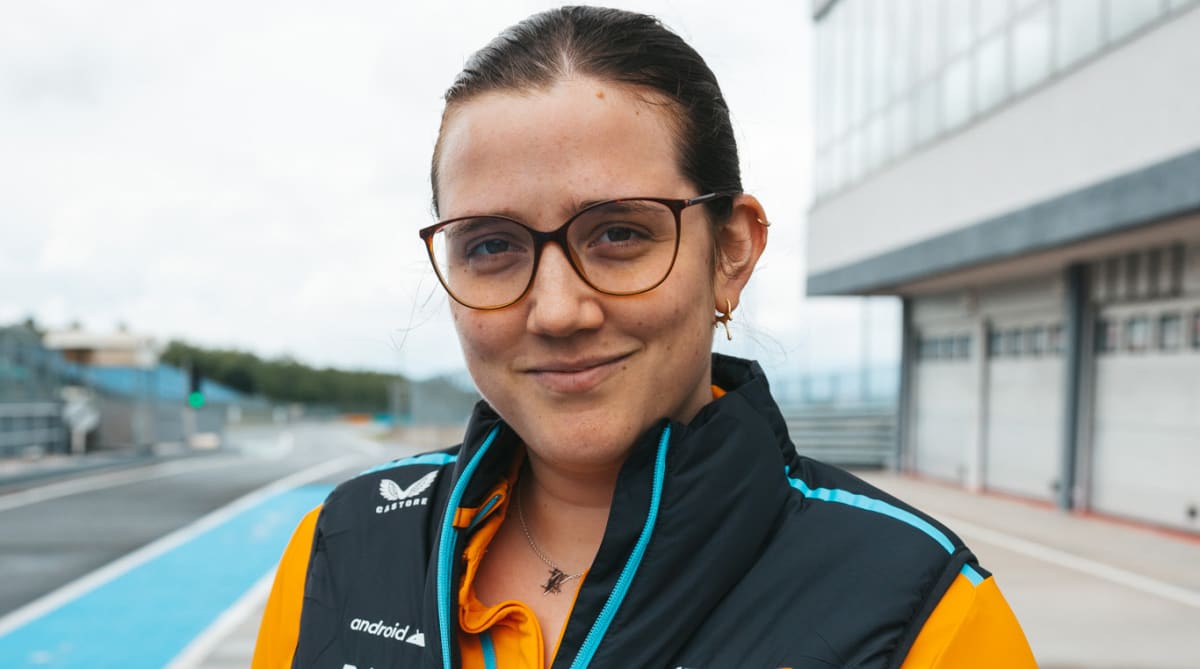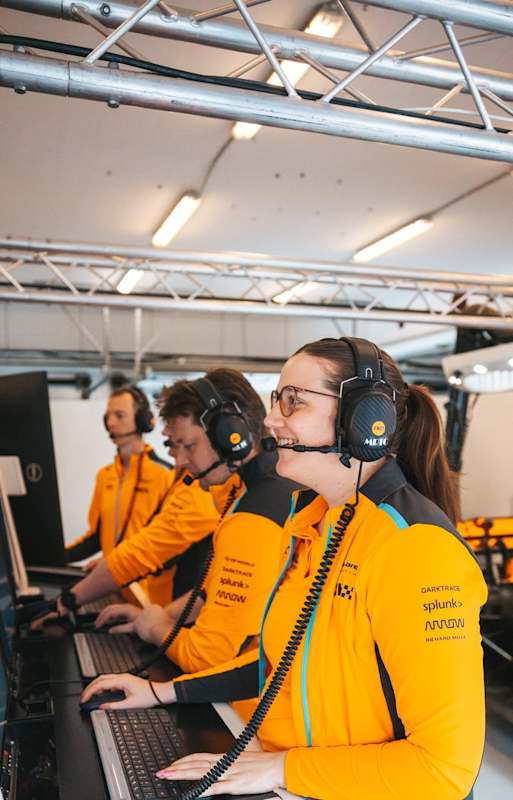Amelia Lewis was first introduced to the world of motor racing as a young girl. Her father was a huge Formula One fan, especially during the Michael Schumacher years, so the Grand Prix was always on over the weekends. Then one day her dad was out of the house on race day, but Amelia still seeked out F1 to watch on her own. That’s how she knew she was hooked.
Along with the speed, thrill and entertainment, there was another element to the sport that piqued her interest: how it all worked. Studying math and physics at school, Lewis recalls how she was fascinated by activities like pit stops or various devices on the car and why things are done in certain ways. “You had this whole sport, which was set up around engineering these incredible cars, and I just wanted to know how everything worked,” says Lewis, who now works as an engineer for McLaren Racing. “All of this stuff that I had been learning about in school, I suddenly understood how it was actually playing a part in this really exciting sport.”

Courtesy of McLaren
Despite hearing from race engineers on the television broadcast, such as Rob Smedley who previously worked with the Scuderia Ferrari race team, Lewis didn’t believe she could work in a similar role. In fact, she compared the idea of a career in F1 to becoming an astronaut or a Hollywood star. The concept seemed so distant and unrealistic she stuck to just being a fan. Fast-forward a few years when she started at the University of Bath and that opinion started to change.
“I was really fortunate that my university had a really great placement office, and it was an engineering-specific placement office,” Lewis says. “There was a group of four people whose jobs were just to get the best placement for the engineering students, and so they were really pushing all of the opportunities that came through. I heard about an opportunity at Williams Racing, and the placement office was encouraging people to apply.”
Lewis had also attended a talk from McLaren earlier in the year when she also came to a realization that she was in the right place and taking the right subjects to explore a future in F1. The Williams job was based in the design office, so Lewis applied with the idea that it could be good to get her CV in shape for future opportunities. In the meantime, she spoke with her dad and did some work on the family car to get more practical experience. She got the call to interview, but even then she viewed it as good practice until Williams offered her the position.
“I had such massive impostor syndrome,” she says. “Surely not. There must be people who are better at this than me? Why would they want me? It took me a while to get out of that headspace, because coming into this industry is so cutting edge, and it is the dream for so many others; it can feel so daunting when you’re there. Especially if you don’t necessarily see other people who look like you there, to feel like you do fit.”
Fortunately for Lewis times have changed, as has the feeling out of place. Having more diversity in the workplace thanks to individuals like herself, she’s also taken steps to build up that self-confidence now at McLaren.
“Part of getting rid of that impostor syndrome is doing a good job. I am now confident that I am a really good performance engineer,” Lewis says. “Going into my placement year, I had a lot of people around me on my course telling me I only got the job because I was a girl. Even though I knew that they were just jealous, and I knew that it wasn’t true, there’s still a little part of you that hears it and wants to believe it. A big part is not surrounding myself with those people anymore and having people around me who love me and support me and build me up. I’m somebody who thrives on feedback, so I’ve got a little folder where I’ve saved praise for projects. If somebody emails me and says ‘good job,’ I screenshot that. Whenever I’m feeling like I’m not doing a good job, I might gather a little look in that folder, and think, “You’re not doing great today, but it doesn’t mean you’re not great at your job.”
Today, Lewis works as a specialist performance engineer with McLaren but didn’t initially know about the role. She had been working as a stress engineer, making sure pieces of the car were as light as possible but strong enough to do the job. Then one of her rotations was within vehicle performance, and she fell in love.

Courtesy of McLaren
“I’m a very impatient person and working in vehicle performance was perfect for me,” she says. “You could say, ‘I think this is a problem,’ then you come up with a test, test it in the simulator, and after three or four laps you’ve got an answer. It just really appealed to my personality.”
Though she enjoyed the new role, it wasn’t so easy at first. Lewis says she had a limited background in vehicle performance during school, so she had to really convince those in the department to trust her to develop the necessary skills. She did so, reading through books nightly and going through lectures.
McLaren has been vocal in the past about its desire for a more diverse workforce. In 2021, 43% of its hires across the whole workforce were women. But there’s still progress to be made all around, from employers to schools knowing which STEM subjects might interest young girls. Lewis herself was used to being the only woman in a room, even in college with just 20 women among 200 students in mechanical engineering. Then working in F1? It became even rarer.
“I met a load of fantastic women at my placement at Williams. So I knew there weren’t loads of us, but there were some of us. They were always so encouraging,” Lewis says. “Even coming to McLaren and going to a different team, we’re competitors on track, but there’s still this sense of solidarity, women in F1, that we’re always going to help each other out. I’ve got friends within other F1 teams I only know through F1, because you’ve got to find those networks and grow those friendships because there aren’t many of us.”







